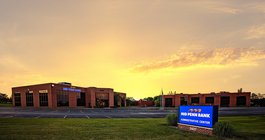
September 30, 2016
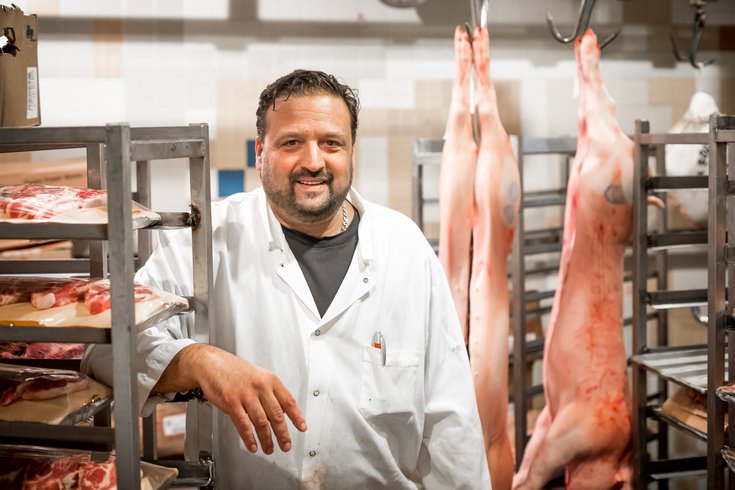 Thom Carroll/PhillyVoice
Thom Carroll/PhillyVoice
Charlie Cannuli, third-generation owner of Cannuli Bros. Quality Meats and Poultry, poses for a photo in the walk-in cooler. Cannuli, who owns four properties and four produce stands in the Italian Market, opposes the Business Improvement District proposal. He said the assessment would cost him $20,000 over five years.
The Italian Market is draped this fall in campaign banners and posters. Every day, there’s a big political debate raging out on South Ninth Street, where they sell fruits and vegetables, as well as in the butcher shops, cheese stores and Italian bakery, where they stuff cannolis.
But it’s not about Hillary or The Donald. Instead, they’re fighting over City Councilman Mark Squilla’s increasingly divisive proposal to turn the Italian Market into a Business Improvement District, known as a “BID.”
In the back of Cannuli Bros. butcher shop last week, owner Charlie Cannuli was getting lobbied to support the BID by Michele Gambino, business manager of the South 9th Street Business Association.
As soon as Gambino left, Johnny Gargano, the owner of a nearby fruit and vegetable stand, crossed the butcher shop’s sawdust-covered floor to bend Cannuli’s ear about the BID being bad for business.
“She’s a yea,” Cannuli says about Gambino. “He’s a nay,” Cannuli says about Gargano. “They’re both pulling on me.”
Up the street from Cannuli’s, at the Visitor’s Information Center, there’s a poster in the front window that says, “Top 10 Reasons to Support the Formation of a Business Improvement District.” At the corner of Ninth and Carpenter, the same poster hangs in the windows of Talluto’s fresh pasta shop and Cardenas Oil & Vinegar Tap Room.
But on the same corner, Gargano has hung a “VOTE NO BID” banner under the awning of his fruit and vegetable stand. And across Ninth Street, there’s another VOTE NO BID banner plastered on the side of another fruit peddler’s pickup truck.
Gargano, who’s been selling produce on the street since 1960, when he was a freshman at Bishop Neumann High School, is one of the leaders of the resistance. Every day, he goes store to store to campaign against the BID, to counter the pro-BID lobbying being done by Gambino.
“They know they’re in trouble,” Gargano says of his political opponents. But he admits in the next breath that he’s running scared because of the arcane state-mandated election process for voting on BIDs.
“It’s rigged for them to win,” Gargano complains about his political opponents in the election campaign that’s scheduled to end Oct. 21.
Gus Sarno, owner of Isgro Pastries at 10th and Christian streets in the Italian Market, is a third-generation owner and supporter of the Business Improvement District. 'I’m absolutely for it,” he says, adding that BIDs in other parts of the city have been successful.
There are 427 properties and 77 curb stands included in the proposed business improvement district, the boundaries of which stretch from 7th to 11th Streets, and from Christian Street to Federal Street.
In order for the proposed BID to be defeated, opponents have to fill out an official objection form and send it by snail mail to Michael A. Decker, chief clerk of the City Council, by the Oct. 21 election deadline.
It will take a no-vote from one-third of the merchants to defeat the BID. But a fruit peddler’s vote doesn’t count as much as a business owner’s. The votes will be weighted in terms of assessed property values. So in order to defeat the BID, the merchants who cast no votes must constitute 33 percent of the district’s assessed property values.
In order for the proposal to be approved, however, BID supporters literally don’t have to do a thing. That’s because if a merchant doesn’t vote, it basically counts as a yes vote. If the proposed BID gets approved, it will go into effect for the next five years.
The voting process is one big reason why some BID opponents are so angry.
“We need to take our own investment into our own hands. If the street’s gonna get better, only we can do it for ourselves. The city doesn’t have the funding.” – Emilio Mignucci, owner, DiBruno Bros.
“It’s unconstitutional,” gripes Anthony D’Angelo, a butcher. “Apathy is not a vote.”
“This is the process set forth by the state of Pennsylvania,” counters Gambino. “And when forming a BID, everyone has to follow the process.”
Asked about her lobbying campaign, Gambino says, “We’re doing damage control.”
“There’s a lot of ugly false information that’s out there,” she says. “That’s what bothers me the most.”
For two years, Gambino says, a steering committee in the market has been working on a BID proposal. They’ve held 10 public meetings and sent out seven informational brochures. According to Gambino, they’ve also brought in Spanish, Cantonese and Vietnamese translators to help local merchants in the increasingly diverse market understand what’s going on.
“Now, we’re like in the 11th hour, and everybody’s like, oh my God, this is actually happening,” Gambino says.
The pro-BID forces have put out an informational flyer outlining a proposed annual budget of $434,000. The money is to be raised by a .2 percent tax on a property owner’s assessment. But there’s a lot of confusion over the figures.
In Charlie Cannuli’s case, the butcher did the math and said that the BID will cost him $8,000 a year. But Gambino says that Cannuli’s math is wrong, and that going by assessments, the BID will cost the butcher less than $4,000.
When Cannuli double-checked the figures, he agreed that Gambino was right, but at the end of five years, he’ll still be out $20,000.
“We don’t even know those people [advocating for the BID]. They’re telling me what’s good for me.” – Mario Girardo, owner of four fruit stands in the Italian Market
While each business owner will be taxed at .2 percent of their property assessment, each fruit and vegetable stand owner will have to pony up $200 a year for the BID, on top of the annual $300 curb stand license fee required by the city.
In Gargano’s case, since he owns five stands, the BID will cost him $1,000 a year.
Of the $434,000 to be raised, $80,000 would be spent to hire a cleaning crew to sweep sidewalks daily, put out new trash cans, remove graffiti, and, twice-a-year, power-wash the streets.
The budget includes $73,000 for the Visitors Center, $70,000 for the annual Italian Market Festival, $60,000 for an executive director, and $8,000 to install surveillance cameras and lighting at “primary locations” throughout the market.
“I’m absolutely for it,” says Gus Sarno, owner of Isgro Pastries at 10th and Christian. There are already 13 BIDs in the city, including Center City, and Passyunk Avenue, Sarno says, and “every place this has surfaced it’s been successful.”
“I know there’s some apprehension” about the cost with his fellow business owners, Sarno says. “Nobody wants to spend more money.” But in the long run, Sarno argues, a BID will raise property values and “give more legitimacy to the area.”
A sign posted in the window of the Italian Market Visitors Center states the reasons merchants should support the 'Business Improvement District.'
But in the Italian Market, still dominated by Italian-Americans historically suspicious of authority, there’s plenty of opposition to the BID.
“We have seen so many of these things before,” Cannuli says of various proposals to improve the market. Cannuli has been working on Ninth Street since the early 1980s in the butcher shop founded by his grandfather.
“They work for two weeks,” Cannuli says of past improvement schemes, “and then everything goes back to the normal chaos.”
Out on Ninth Street, the BID election campaign is pitting merchant against merchant. In the battle of the butchers, the D’Angelo Bros. and the Cannuli Bros. are against the BID; but the two brothers who own Esposito’s Meats are for it.
“I think it will bring some unity to the market,” butcher Lee Esposito says.
In the past, Esposito said, the South Ninth Street Business Association has come up with some “great ideas” to improve the street. But when it comes to paying for any of those great ideas, it’s always the same 15 or so businesses footing the bill.
“We need help pulling the wagon,” Esposito says.
In the battle of the cheese mongers, Emilio Mignucci, owner of DiBruno Bros., is a big-time BID advocate.
“We need to take our own investment into our own hands,” says Mignucci, who took over his grandfather’s business 26 years ago. “If the street’s gonna get better, only we can do it for ourselves. The city doesn’t have the funding.”
What Mignucci wants to do is to make the Italian Market “a cleaner, safer and more desirable shopping and restaurant district,” he says, “just to make it a better vibe.”
As far as the cost is concerned, Mignucci says he’s one of the top three assessments on the street, and that the BID will cost him $4,500 a year.
It’s money well spent, Mignucci figures, because for the Italian Market, the BID is the future. The alternative? Do nothing and watch the street continue to decline, Mignucci says. Every year, foot traffic in the market decreases.
Commemorative flags celebrating the Italian Market's 100th anniversary in 2015 line both sides of South 9th Street in South Philadelphia. A proposal for a Business Improvement District has divided merchants, who would pay for cleaning crew to sweep streets daily and $60,000 annually for an executive director.
But Mignucci’s next-door neighbor, Sal Auriemma, owner of Claudio’s Specialty Foods, another big cheese store, is dead-set against the BID. Why? Auriemma says he’s wary of the cost and what he says is a lack of control over how the money will be spent.
“I don’t think you need one more person taking money out of your pocket,” Auriemma says. He wasn’t swayed by Gambino’s personal visit to his store last week. Auriemma says he remains “opposed until proven wrong.”
As far as the big produce venders are concerned, Michael Anastasio, leaning on a six-foot-high stack of California grapes, is another nay-sayer.
“I’m all for betterment of the area,” says Anastasio, whose wholesale produce company supplies many local restaurants. But, Anastasio, says he already pays his employees to clean up his property, and he’s already installed lights and cameras.
“I don’t feel they’re offering any value to us,” Anastasio says. “It’s opening us up to a hit.”
At Fante’s, the cooking supply store, longtime owner Mariella Giovannucci Esposito and her daughter, Liana, are both in favor the BID.
Trash in the market is a big problem, the women say. It piles up in the streets every day. If the market was cleaner and safer, and had better lighting, “people would feel more comfortable coming here in the evenings,” Liana says. “It would help the restaurants.”
“Expectations are higher from many customers who are shopping the market now,” Mariella says about her customers.
A sign offers more information about the proposed Business Improvement District in front of the Italian Market Visitors Center on South 9th Street.
Many Ninth Street lifers, however, remain staunchly opposed to the BID. Out on Ninth Street, Betty Ann Mongelluzzo, who owns a flower shop, was sweeping the sidewalk in front of her store.
“I don’t need to pay $60,000,” she says, to hire an executive director to supervise employees to sweep the streets.
“Believe me, it’s a scam,” says Mario Girardo, while he was peddling red and green peppers three for $1. As the owner of four fruit stands, Giarardo is looking at an annual bill of $800.
“I’ve been here all my life,” Girardo says. He started working on Ninth Street during the late 1950s, when he was in grade school, helping out his father.
“We don’t even know those people,” Girardo says about some of the advocates pushing the BID. “They’re telling me what’s good for me.”
He’s got a different view of the street. In the 1970s, Girardo says, when Rocky Balboa first ran through the market and made it famous, “It was really dirty back then.”
On the outskirts of the proposed district, some business owners feel trapped by the BID proposal.
Amin Bitar, who owns a Middle East grocery store and grill at 10th and Federal, doesn’t think the proposed district will do much for his business.
“We’re off of Ninth Street, but we don’t get the benefits of Ninth Street,” he says. He remembers a $3 million renovation project by the city in the late 1990s that included installing new awnings in the Italian Market. His store wasn’t eligible.
“I have no problem paying for something if I’m getting something in return,” he says. But instead, “We’re the stepchild. We always seem to be on the periphery.”
Barry Wilensky owns a mom and pop hardware store founded by his grandfather a century ago on the 1100 block of East Passyunk. On his block, he says, there’s an auto supply store, two auto repair shops, and a tire shop.
“We’re all kicking in [for the business district] and the question is, for what return,” he asks.
When they hold the Italian Market Festival, Wilensky says, it's a “traffic nightmare” that does nothing for his business. When busloads of tourists ride through the Italian Market, they don’t stop at his hardware store to buy a box of nails.
“We’re in the district to spread out the cost,” Wilensky argues. “They went to a larger footprint” because they needed more revenue.
He’s already mailed in his no vote.
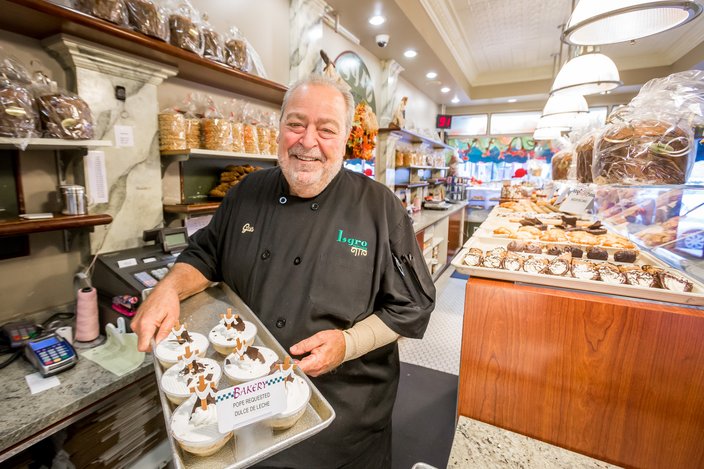 Thom Carroll/PhillyVoice
Thom Carroll/PhillyVoice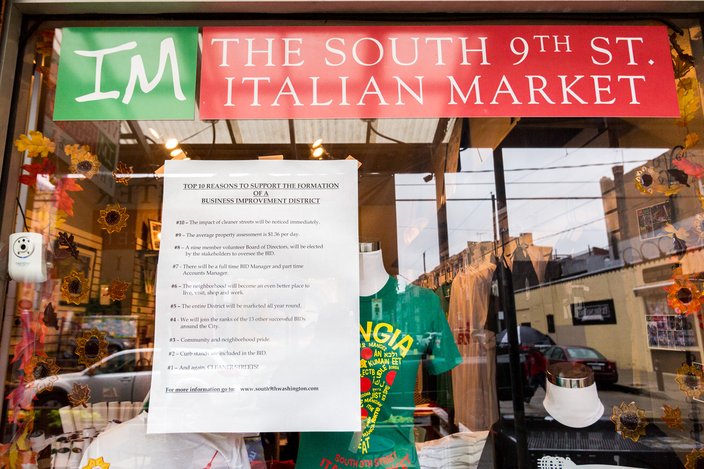 Thom Carroll/PhillyVoice
Thom Carroll/PhillyVoice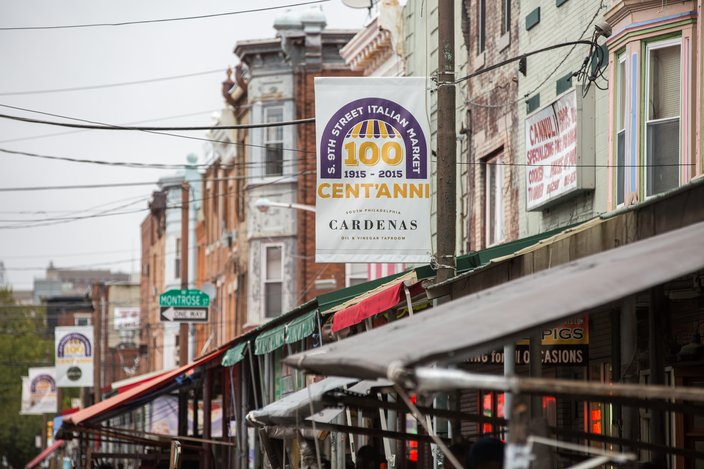 Thom Carroll/PhillyVoice
Thom Carroll/PhillyVoice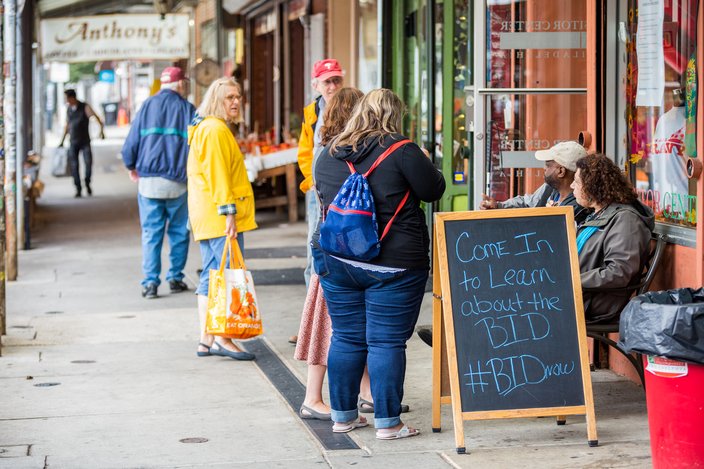 Thom Carroll/PhillyVoice
Thom Carroll/PhillyVoice